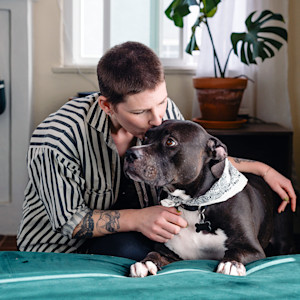
Share Article
In This Article:
Do Dogs Have Heart Attacks? Causes of Heart Attacks in Dogs Signs and Symptoms of Heart Attacks in Dogs Treatment of Heart Attacks in Dogs
Heart attacks in dogs, though extremely rare, can happen. Symptoms include lethargy, difficulty breathing, and collapse. Dogs can also suffer acute heart failure due to underlying heart disease or genetics. Immediate veterinary attention is crucial for diagnosis and treatment.
Do dogs have heart attacks?
When pet parents think about dog health, they often pull from human medical conditions and ask questions like, “can a dog have a stroke or a heart attack?” The answer is: both can occur in dogs but nowhere near as often as in people. Heart attacks in dogs can happen, but they are extremely rare.
When thinking about dog heart conditions, heart failure is more commonly discussed because it occurs more frequently in dogs than heart attacks. Canine heart failure typically refers to a reduction in the heart’s ability to function normally; a condition that progresses over time. Canine heart attacks occur more suddenly and are often fatal.

What is a heart attack in a dog?
The medical term for a heart attack is myocardial infarction. This means that part of the heart muscle (the myocardium) does not receive blood supply, leading to damage or death of that muscle tissue (infarction). This lack of blood flow can occur if the coronary arteries (the arteries that supply blood flow to the heart muscles) are blocked or start to leak. While it’s not a common concern when it comes to dog heart health, there are still signs and risk factors you can watch out for.
Causes of heart attacks in dogs
In humans, the classic cause of a heart attack is blockage of a coronary artery due to a buildup of plaque made up of fat, cholesterol, and other substances. This plaque buildup can develop in dogs as well, but is less common. Any condition that increases the risk of abnormal blood clot formation in dogs can also increase their risk for heart attack. Possible causes and risk factors of heart attacks in dogs include:
Atherosclerosis
Atherosclerosis refers to the hardening of arteries from the buildup of plaque. This is a common cause of heart attacks in people, but it is not commonly diagnosed in dogs. Dogs with hypothyroid disease, diabetes melitus, and hypercholesterolemia may have a higher risk of developing atherosclerosis.
Abnormal blood clot formation
When the body forms too many blood clots, there is a risk of a blood clot interfering with the blood supply to the heart by blocking a coronary artery. The process of forming unnecessary blood clots is called hypercoagulation. Hypercoagulation usually develops as a result of other health conditions including:
Immune-mediated hemolytic anemia (IMHA)
Hyperadrenocorticism (Cushing’s disease)
Nephrotic syndrome (a specific type of kidney disease that results in protein loss)
Vasculitis (inflammation of the blood vessels)
Severe infection or inflammation
Dogs can become critically ill from severe bacterial infections or inflammation. When a bacterial infection spreads to a dog’s bloodstream, it is a condition called sepsis. Sepsis can cause excessive inflammation throughout the body. Dogs with these conditions can develop tiny areas of necrosis in the heart muscle due to lack of blood flow. Dogs with severe infections or whole-body inflammation have a guarded to poor prognosis for survival.
Tumors
Tumors can invade or disrupt the arteries that provide blood supply to the heart muscle. These tumors can originate from the heart or the blood vessels.
Signs and symptoms of heart attacks in dogs
Because true heart attacks (myocardial infarctions) are so rare in dogs, there is not a list of specific dog heart attack symptoms. However, there are signs commonly seen with various forms of acute heart disease in dogs, including:
Labored or difficulty breathing
Lethargy
Weakness
Difficulty walking
Collapse
Sudden death
Treatment of heart attacks in dogs
If a dog has collapsed or has suffered any type of cardiac event, prompt recognition and treatment is key to survival. Veterinary staff can work to stabilize a dog by providing oxygen supplementation and any other treatments that may help normalize a dog’s vital signs.
There is not a routine test to diagnose heart attacks in dogs, but a veterinarian can run diagnostics to evaluate heart function, heart rhythm, and organ function. This may include radiographs of the chest, echocardiogram (ultrasound of the heart), electrocardiogram (ECG), and blood work.
Treatment depends on the underlying cause and a dog’s condition when they present to a veterinary hospital, but the unfortunate truth is that a dog’s chance of survival after having a heart attack is quite low.
FAQs (People also ask):
What does a dog heart attack look like?
There are no specific signs of a dog heart attack. Dogs experiencing a heart attack may exhibit lethargy, weakness, trouble walking, difficulty breathing, acute collapse, or sudden death.
What causes a dog to have a heart attack?
Dog heart attacks are extremely rare and can occur as a result of any condition that impedes blood flow to the heart muscle. Possible causes include atherosclerosis, abnormal blood clot formation, tumors, and severe infection.
How can I prevent my dog from having a heart attack?
To help prevent heart attacks, dog parents can focus on creating a lifestyle that contributes to heart health and overall wellbeing. This includes providing a complete and balanced diet, plenty of exercise, weight management, and routine vet visits.
References:
Myocardial infarction in dogs and cats: 37 cases (1985-1994)opens in new tab
Canine Atherosclerosis: Why Does it Occur? — ACVIM 2008
Myocardial Infarction: Symptoms and Treatmentsopens in new tab

Dr. Alycia Washington, DVM, MS
Alycia Washington is a small-animal emergency veterinarian with over 10 years of experience based in North Carolina. She works as a relief veterinarianopens in new tab and provides services to numerous emergency and specialty hospitals. She also works as a veterinary writer with a focus on educating pet parents.
Related articles
![A woman checking her dog for ticks outside in a grassy field.]()
Can Dogs Get Lyme Disease? Canine Lyme Disease Symptoms, Treatment, and Prognosis
It is peak tick season, so we asked a veterinarian for tips on how to prevent this dreaded disease.
![dog sneezing outside in grass]()
Why Do Dogs Sneeze?
Other than to completely freak you out.
![Australian shepherd panting with tongue out, walking ahead of owners.]()
How to Keep Your Pets Safe During Extreme Heat Waves
As scorching, long-lasting temperatures become the new normal, here’s how to help keep your pets cool and healthy.
Can Dogs Get Sunburns? Signs, Treatment
It’s good to know ahead of all the summer fun you’re gonna have together.
![Woman kisses her black pit bull dog on the head.]()
What Can I Give My Dog for an Upset Stomach?
It stinks to see them uncomfortable. Here’s what you can do.
![Close up photo of Corgi dog staring up at a flying bee]()
What to Do If Your Dog Gets Stung By a Bee
From how to get the stinger out at home to when it’s time to go to the ER.
![Staffordshire bull terrier dog eating grass]()
15 Things You Think Are Toxic for Dogs — But Actually Aren’t
From (human) prescription meds to poinsettia plants, these "toxic" items may not be so bad for your pup.
![Dog laying down in dog bed and coughing]()
Why Is My Dog Coughing?
Seven reasons to be concerned when your dog is coughing.
What Can I Give My Dog for Diarrhea?
It’s not fun for anyone.













